Analysis of 21st Century Leadership: Competencies and Challenges
VerifiedAdded on 2020/01/28
|10
|3569
|114
Report
AI Summary
This report provides an in-depth analysis of 21st-century leadership, focusing on the key competencies required for effective leadership in modern organizations. It begins by predicting essential skills, such as social intelligence, interpersonal skills, emotional intelligence, fortitude, conflict management, decision-making, political skills, influence, and area expertise, and contrasts them with classical leadership capabilities, highlighting similarities and differences. The report then examines the causes of changes in leadership competencies, including mission advancement, collaboration, operational effectiveness, and personal growth, and how these changes impact organizational performance. It explores the impact of these changes on various aspects of organizational operations, such as decision-making, innovation, project management, and financial stability, and how these factors influence customer satisfaction and overall success. The report synthesizes academic research, offering critical insights into the evolving landscape of leadership in the 21st century.
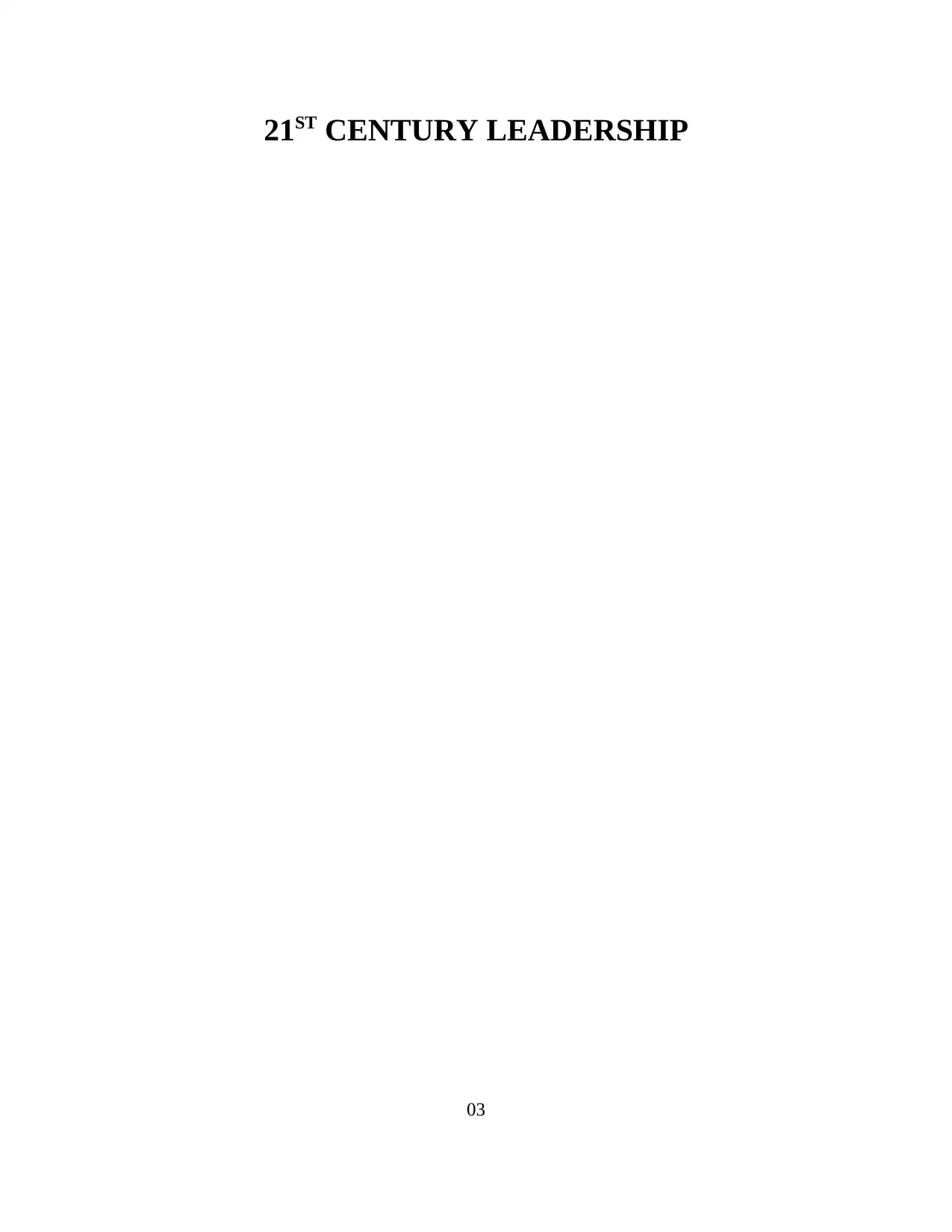
21ST CENTURY LEADERSHIP
03
03
Paraphrase This Document
Need a fresh take? Get an instant paraphrase of this document with our AI Paraphraser
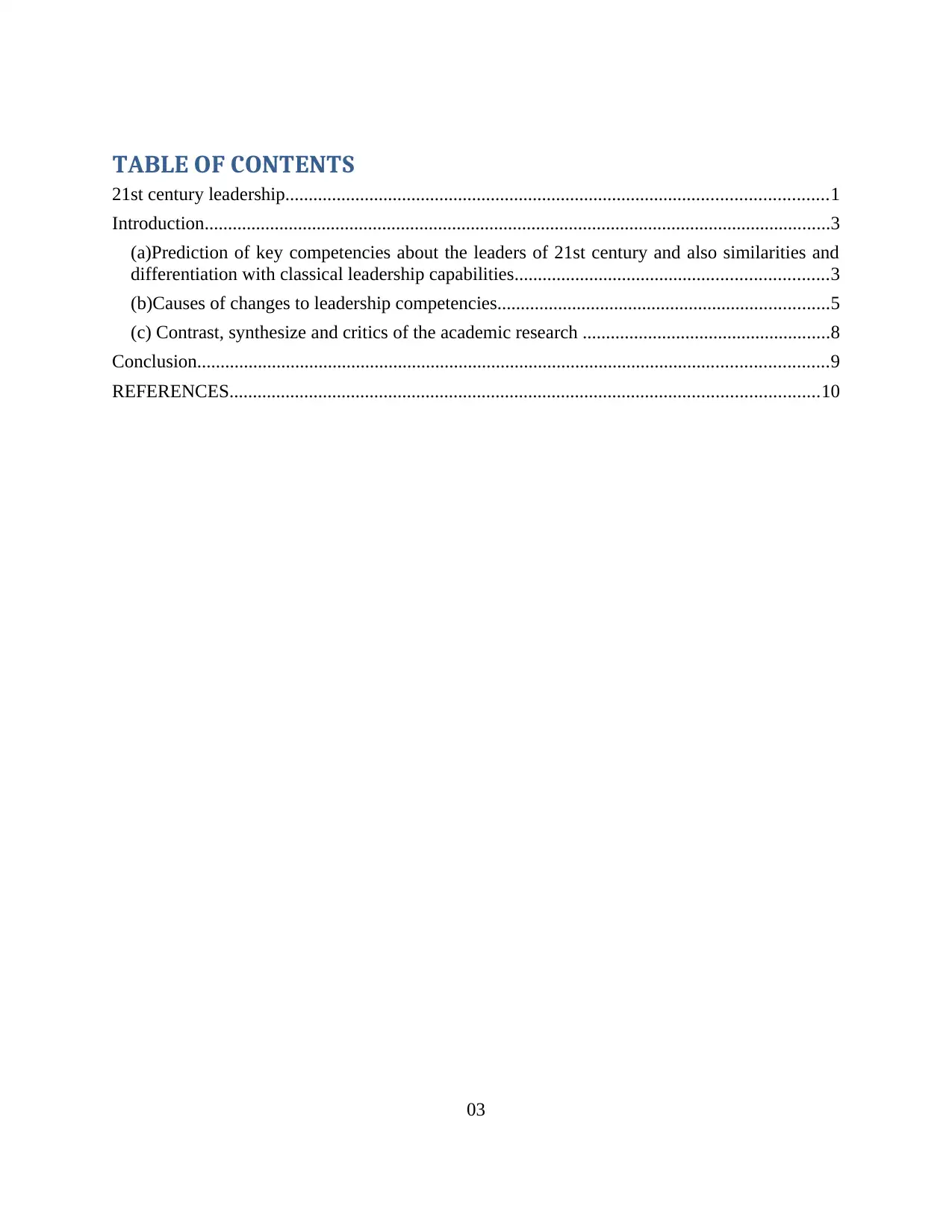
TABLE OF CONTENTS
21st century leadership....................................................................................................................1
Introduction......................................................................................................................................3
(a)Prediction of key competencies about the leaders of 21st century and also similarities and
differentiation with classical leadership capabilities...................................................................3
(b)Causes of changes to leadership competencies.......................................................................5
(c) Contrast, synthesize and critics of the academic research .....................................................8
Conclusion.......................................................................................................................................9
REFERENCES..............................................................................................................................10
03
21st century leadership....................................................................................................................1
Introduction......................................................................................................................................3
(a)Prediction of key competencies about the leaders of 21st century and also similarities and
differentiation with classical leadership capabilities...................................................................3
(b)Causes of changes to leadership competencies.......................................................................5
(c) Contrast, synthesize and critics of the academic research .....................................................8
Conclusion.......................................................................................................................................9
REFERENCES..............................................................................................................................10
03
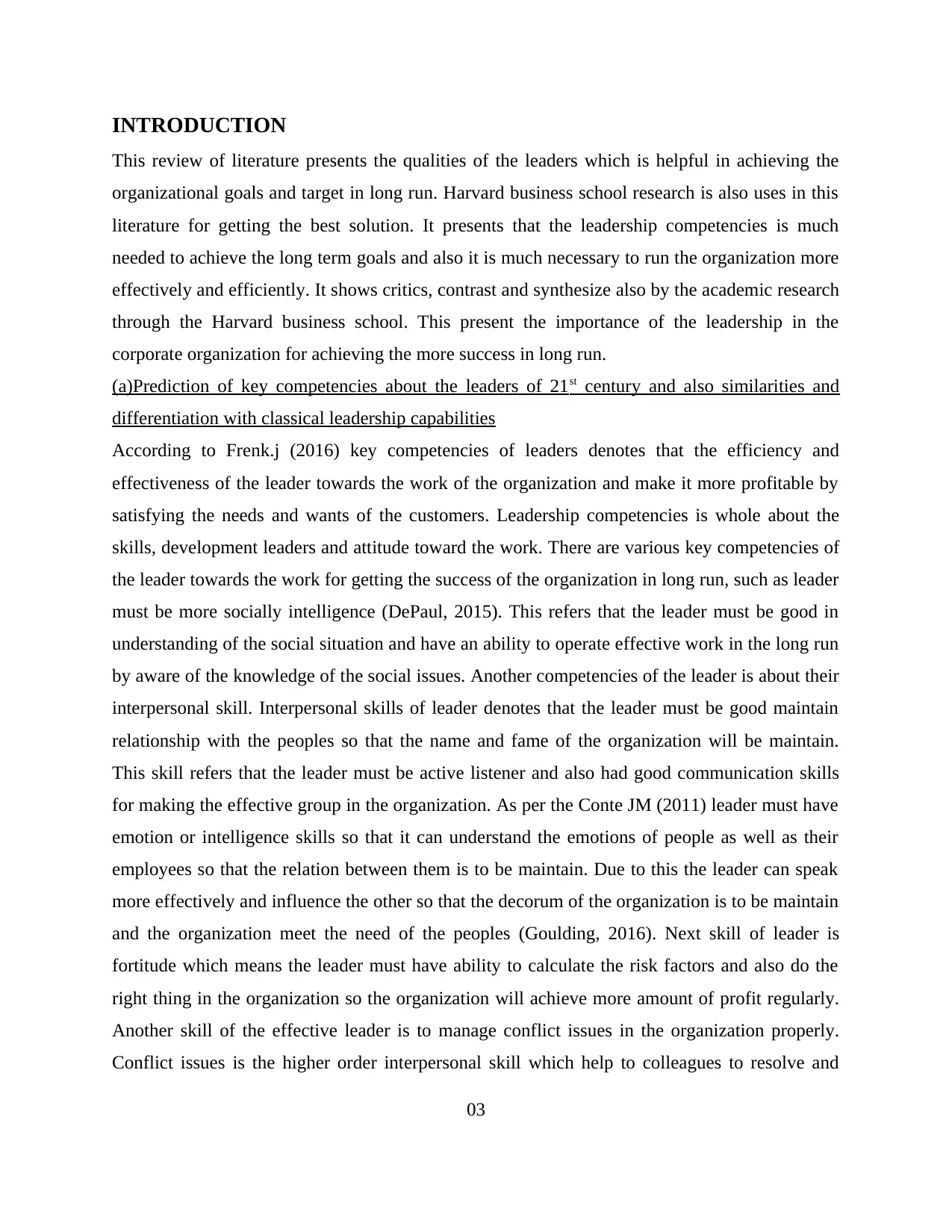
INTRODUCTION
This review of literature presents the qualities of the leaders which is helpful in achieving the
organizational goals and target in long run. Harvard business school research is also uses in this
literature for getting the best solution. It presents that the leadership competencies is much
needed to achieve the long term goals and also it is much necessary to run the organization more
effectively and efficiently. It shows critics, contrast and synthesize also by the academic research
through the Harvard business school. This present the importance of the leadership in the
corporate organization for achieving the more success in long run.
(a)Prediction of key competencies about the leaders of 21st century and also similarities and
differentiation with classical leadership capabilities
According to Frenk.j (2016) key competencies of leaders denotes that the efficiency and
effectiveness of the leader towards the work of the organization and make it more profitable by
satisfying the needs and wants of the customers. Leadership competencies is whole about the
skills, development leaders and attitude toward the work. There are various key competencies of
the leader towards the work for getting the success of the organization in long run, such as leader
must be more socially intelligence (DePaul, 2015). This refers that the leader must be good in
understanding of the social situation and have an ability to operate effective work in the long run
by aware of the knowledge of the social issues. Another competencies of the leader is about their
interpersonal skill. Interpersonal skills of leader denotes that the leader must be good maintain
relationship with the peoples so that the name and fame of the organization will be maintain.
This skill refers that the leader must be active listener and also had good communication skills
for making the effective group in the organization. As per the Conte JM (2011) leader must have
emotion or intelligence skills so that it can understand the emotions of people as well as their
employees so that the relation between them is to be maintain. Due to this the leader can speak
more effectively and influence the other so that the decorum of the organization is to be maintain
and the organization meet the need of the peoples (Goulding, 2016). Next skill of leader is
fortitude which means the leader must have ability to calculate the risk factors and also do the
right thing in the organization so the organization will achieve more amount of profit regularly.
Another skill of the effective leader is to manage conflict issues in the organization properly.
Conflict issues is the higher order interpersonal skill which help to colleagues to resolve and
03
This review of literature presents the qualities of the leaders which is helpful in achieving the
organizational goals and target in long run. Harvard business school research is also uses in this
literature for getting the best solution. It presents that the leadership competencies is much
needed to achieve the long term goals and also it is much necessary to run the organization more
effectively and efficiently. It shows critics, contrast and synthesize also by the academic research
through the Harvard business school. This present the importance of the leadership in the
corporate organization for achieving the more success in long run.
(a)Prediction of key competencies about the leaders of 21st century and also similarities and
differentiation with classical leadership capabilities
According to Frenk.j (2016) key competencies of leaders denotes that the efficiency and
effectiveness of the leader towards the work of the organization and make it more profitable by
satisfying the needs and wants of the customers. Leadership competencies is whole about the
skills, development leaders and attitude toward the work. There are various key competencies of
the leader towards the work for getting the success of the organization in long run, such as leader
must be more socially intelligence (DePaul, 2015). This refers that the leader must be good in
understanding of the social situation and have an ability to operate effective work in the long run
by aware of the knowledge of the social issues. Another competencies of the leader is about their
interpersonal skill. Interpersonal skills of leader denotes that the leader must be good maintain
relationship with the peoples so that the name and fame of the organization will be maintain.
This skill refers that the leader must be active listener and also had good communication skills
for making the effective group in the organization. As per the Conte JM (2011) leader must have
emotion or intelligence skills so that it can understand the emotions of people as well as their
employees so that the relation between them is to be maintain. Due to this the leader can speak
more effectively and influence the other so that the decorum of the organization is to be maintain
and the organization meet the need of the peoples (Goulding, 2016). Next skill of leader is
fortitude which means the leader must have ability to calculate the risk factors and also do the
right thing in the organization so the organization will achieve more amount of profit regularly.
Another skill of the effective leader is to manage conflict issues in the organization properly.
Conflict issues is the higher order interpersonal skill which help to colleagues to resolve and
03
⊘ This is a preview!⊘
Do you want full access?
Subscribe today to unlock all pages.

Trusted by 1+ million students worldwide
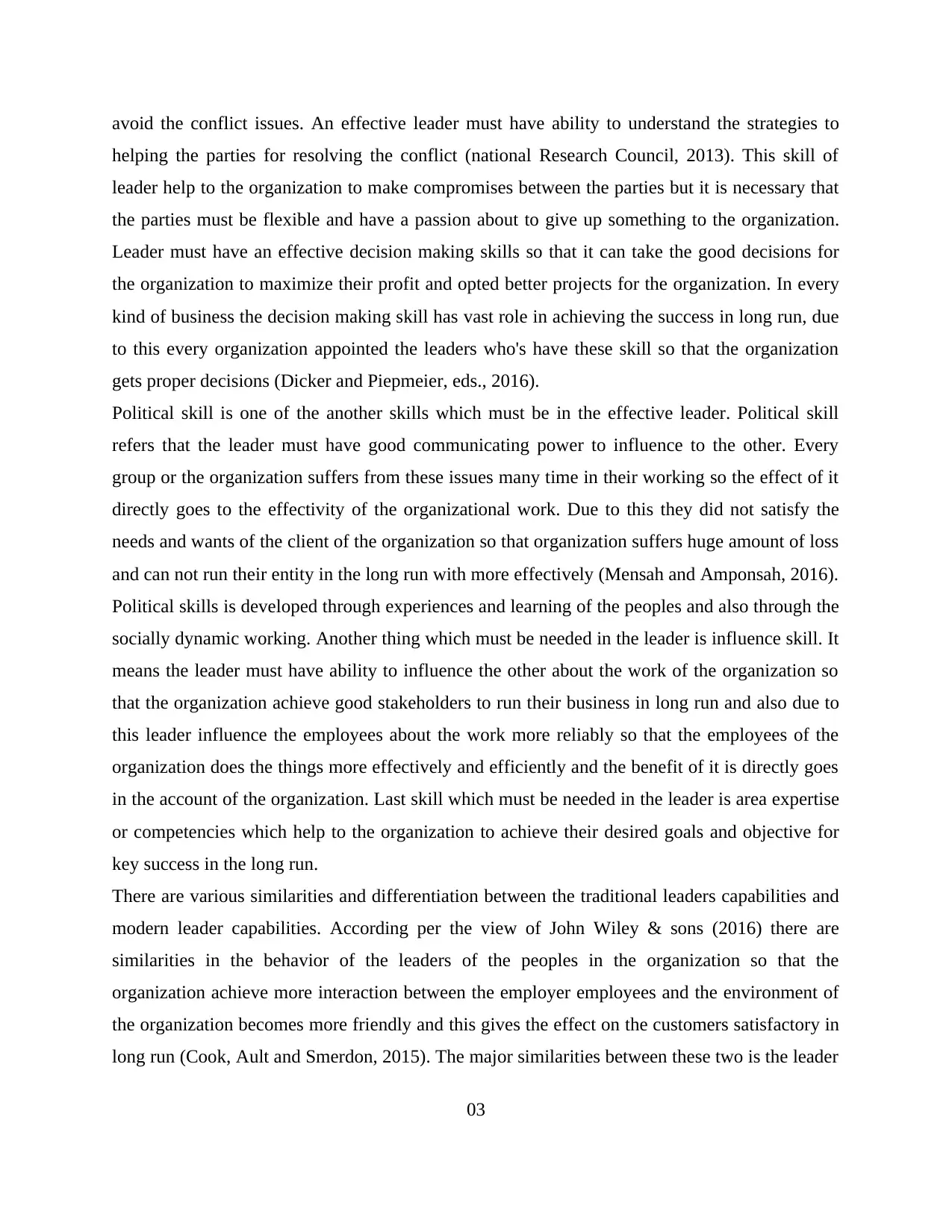
avoid the conflict issues. An effective leader must have ability to understand the strategies to
helping the parties for resolving the conflict (national Research Council, 2013). This skill of
leader help to the organization to make compromises between the parties but it is necessary that
the parties must be flexible and have a passion about to give up something to the organization.
Leader must have an effective decision making skills so that it can take the good decisions for
the organization to maximize their profit and opted better projects for the organization. In every
kind of business the decision making skill has vast role in achieving the success in long run, due
to this every organization appointed the leaders who's have these skill so that the organization
gets proper decisions (Dicker and Piepmeier, eds., 2016).
Political skill is one of the another skills which must be in the effective leader. Political skill
refers that the leader must have good communicating power to influence to the other. Every
group or the organization suffers from these issues many time in their working so the effect of it
directly goes to the effectivity of the organizational work. Due to this they did not satisfy the
needs and wants of the client of the organization so that organization suffers huge amount of loss
and can not run their entity in the long run with more effectively (Mensah and Amponsah, 2016).
Political skills is developed through experiences and learning of the peoples and also through the
socially dynamic working. Another thing which must be needed in the leader is influence skill. It
means the leader must have ability to influence the other about the work of the organization so
that the organization achieve good stakeholders to run their business in long run and also due to
this leader influence the employees about the work more reliably so that the employees of the
organization does the things more effectively and efficiently and the benefit of it is directly goes
in the account of the organization. Last skill which must be needed in the leader is area expertise
or competencies which help to the organization to achieve their desired goals and objective for
key success in the long run.
There are various similarities and differentiation between the traditional leaders capabilities and
modern leader capabilities. According per the view of John Wiley & sons (2016) there are
similarities in the behavior of the leaders of the peoples in the organization so that the
organization achieve more interaction between the employer employees and the environment of
the organization becomes more friendly and this gives the effect on the customers satisfactory in
long run (Cook, Ault and Smerdon, 2015). The major similarities between these two is the leader
03
helping the parties for resolving the conflict (national Research Council, 2013). This skill of
leader help to the organization to make compromises between the parties but it is necessary that
the parties must be flexible and have a passion about to give up something to the organization.
Leader must have an effective decision making skills so that it can take the good decisions for
the organization to maximize their profit and opted better projects for the organization. In every
kind of business the decision making skill has vast role in achieving the success in long run, due
to this every organization appointed the leaders who's have these skill so that the organization
gets proper decisions (Dicker and Piepmeier, eds., 2016).
Political skill is one of the another skills which must be in the effective leader. Political skill
refers that the leader must have good communicating power to influence to the other. Every
group or the organization suffers from these issues many time in their working so the effect of it
directly goes to the effectivity of the organizational work. Due to this they did not satisfy the
needs and wants of the client of the organization so that organization suffers huge amount of loss
and can not run their entity in the long run with more effectively (Mensah and Amponsah, 2016).
Political skills is developed through experiences and learning of the peoples and also through the
socially dynamic working. Another thing which must be needed in the leader is influence skill. It
means the leader must have ability to influence the other about the work of the organization so
that the organization achieve good stakeholders to run their business in long run and also due to
this leader influence the employees about the work more reliably so that the employees of the
organization does the things more effectively and efficiently and the benefit of it is directly goes
in the account of the organization. Last skill which must be needed in the leader is area expertise
or competencies which help to the organization to achieve their desired goals and objective for
key success in the long run.
There are various similarities and differentiation between the traditional leaders capabilities and
modern leader capabilities. According per the view of John Wiley & sons (2016) there are
similarities in the behavior of the leaders of the peoples in the organization so that the
organization achieve more interaction between the employer employees and the environment of
the organization becomes more friendly and this gives the effect on the customers satisfactory in
long run (Cook, Ault and Smerdon, 2015). The major similarities between these two is the leader
03
Paraphrase This Document
Need a fresh take? Get an instant paraphrase of this document with our AI Paraphraser
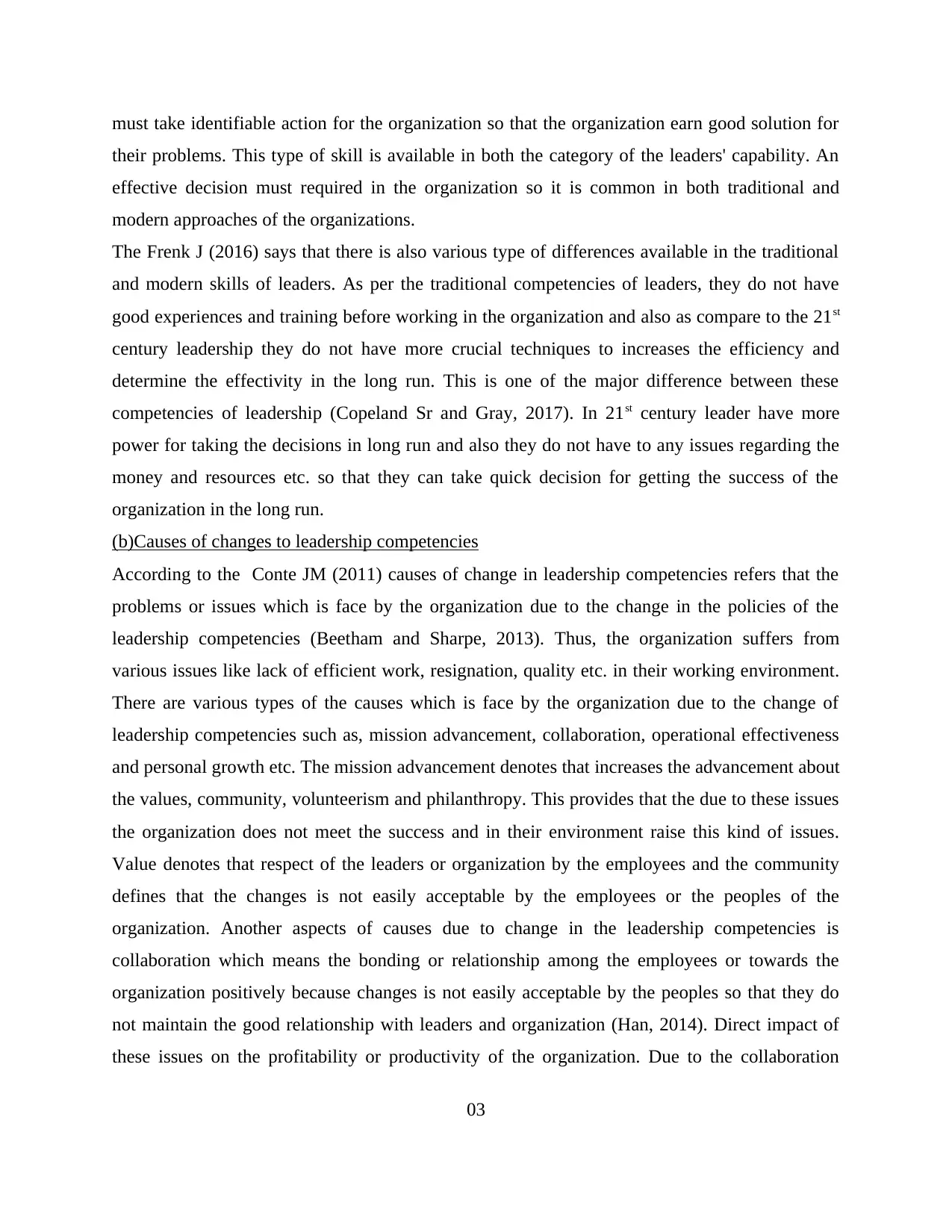
must take identifiable action for the organization so that the organization earn good solution for
their problems. This type of skill is available in both the category of the leaders' capability. An
effective decision must required in the organization so it is common in both traditional and
modern approaches of the organizations.
The Frenk J (2016) says that there is also various type of differences available in the traditional
and modern skills of leaders. As per the traditional competencies of leaders, they do not have
good experiences and training before working in the organization and also as compare to the 21st
century leadership they do not have more crucial techniques to increases the efficiency and
determine the effectivity in the long run. This is one of the major difference between these
competencies of leadership (Copeland Sr and Gray, 2017). In 21st century leader have more
power for taking the decisions in long run and also they do not have to any issues regarding the
money and resources etc. so that they can take quick decision for getting the success of the
organization in the long run.
(b)Causes of changes to leadership competencies
According to the Conte JM (2011) causes of change in leadership competencies refers that the
problems or issues which is face by the organization due to the change in the policies of the
leadership competencies (Beetham and Sharpe, 2013). Thus, the organization suffers from
various issues like lack of efficient work, resignation, quality etc. in their working environment.
There are various types of the causes which is face by the organization due to the change of
leadership competencies such as, mission advancement, collaboration, operational effectiveness
and personal growth etc. The mission advancement denotes that increases the advancement about
the values, community, volunteerism and philanthropy. This provides that the due to these issues
the organization does not meet the success and in their environment raise this kind of issues.
Value denotes that respect of the leaders or organization by the employees and the community
defines that the changes is not easily acceptable by the employees or the peoples of the
organization. Another aspects of causes due to change in the leadership competencies is
collaboration which means the bonding or relationship among the employees or towards the
organization positively because changes is not easily acceptable by the peoples so that they do
not maintain the good relationship with leaders and organization (Han, 2014). Direct impact of
these issues on the profitability or productivity of the organization. Due to the collaboration
03
their problems. This type of skill is available in both the category of the leaders' capability. An
effective decision must required in the organization so it is common in both traditional and
modern approaches of the organizations.
The Frenk J (2016) says that there is also various type of differences available in the traditional
and modern skills of leaders. As per the traditional competencies of leaders, they do not have
good experiences and training before working in the organization and also as compare to the 21st
century leadership they do not have more crucial techniques to increases the efficiency and
determine the effectivity in the long run. This is one of the major difference between these
competencies of leadership (Copeland Sr and Gray, 2017). In 21st century leader have more
power for taking the decisions in long run and also they do not have to any issues regarding the
money and resources etc. so that they can take quick decision for getting the success of the
organization in the long run.
(b)Causes of changes to leadership competencies
According to the Conte JM (2011) causes of change in leadership competencies refers that the
problems or issues which is face by the organization due to the change in the policies of the
leadership competencies (Beetham and Sharpe, 2013). Thus, the organization suffers from
various issues like lack of efficient work, resignation, quality etc. in their working environment.
There are various types of the causes which is face by the organization due to the change of
leadership competencies such as, mission advancement, collaboration, operational effectiveness
and personal growth etc. The mission advancement denotes that increases the advancement about
the values, community, volunteerism and philanthropy. This provides that the due to these issues
the organization does not meet the success and in their environment raise this kind of issues.
Value denotes that respect of the leaders or organization by the employees and the community
defines that the changes is not easily acceptable by the employees or the peoples of the
organization. Another aspects of causes due to change in the leadership competencies is
collaboration which means the bonding or relationship among the employees or towards the
organization positively because changes is not easily acceptable by the peoples so that they do
not maintain the good relationship with leaders and organization (Han, 2014). Direct impact of
these issues on the profitability or productivity of the organization. Due to the collaboration
03
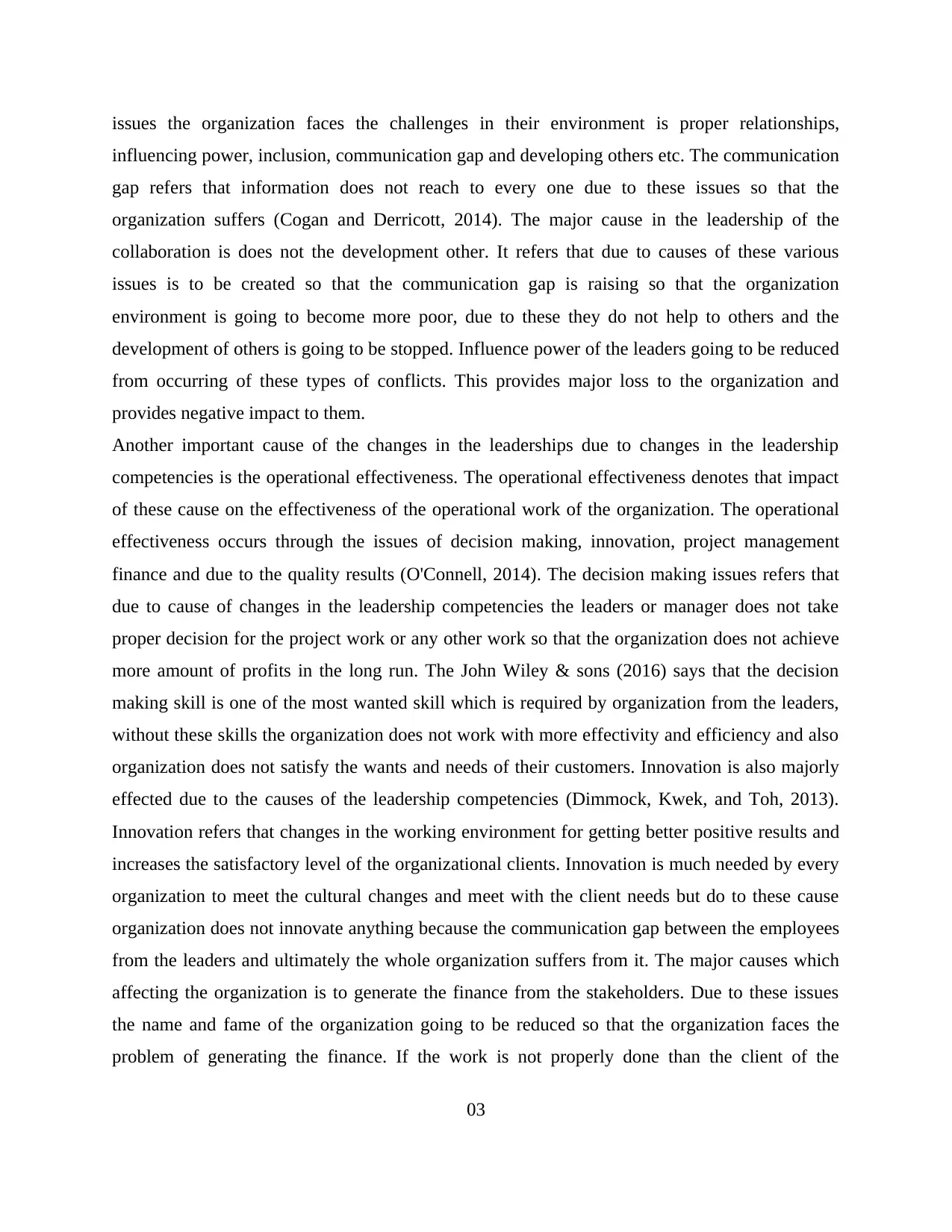
issues the organization faces the challenges in their environment is proper relationships,
influencing power, inclusion, communication gap and developing others etc. The communication
gap refers that information does not reach to every one due to these issues so that the
organization suffers (Cogan and Derricott, 2014). The major cause in the leadership of the
collaboration is does not the development other. It refers that due to causes of these various
issues is to be created so that the communication gap is raising so that the organization
environment is going to become more poor, due to these they do not help to others and the
development of others is going to be stopped. Influence power of the leaders going to be reduced
from occurring of these types of conflicts. This provides major loss to the organization and
provides negative impact to them.
Another important cause of the changes in the leaderships due to changes in the leadership
competencies is the operational effectiveness. The operational effectiveness denotes that impact
of these cause on the effectiveness of the operational work of the organization. The operational
effectiveness occurs through the issues of decision making, innovation, project management
finance and due to the quality results (O'Connell, 2014). The decision making issues refers that
due to cause of changes in the leadership competencies the leaders or manager does not take
proper decision for the project work or any other work so that the organization does not achieve
more amount of profits in the long run. The John Wiley & sons (2016) says that the decision
making skill is one of the most wanted skill which is required by organization from the leaders,
without these skills the organization does not work with more effectivity and efficiency and also
organization does not satisfy the wants and needs of their customers. Innovation is also majorly
effected due to the causes of the leadership competencies (Dimmock, Kwek, and Toh, 2013).
Innovation refers that changes in the working environment for getting better positive results and
increases the satisfactory level of the organizational clients. Innovation is much needed by every
organization to meet the cultural changes and meet with the client needs but do to these cause
organization does not innovate anything because the communication gap between the employees
from the leaders and ultimately the whole organization suffers from it. The major causes which
affecting the organization is to generate the finance from the stakeholders. Due to these issues
the name and fame of the organization going to be reduced so that the organization faces the
problem of generating the finance. If the work is not properly done than the client of the
03
influencing power, inclusion, communication gap and developing others etc. The communication
gap refers that information does not reach to every one due to these issues so that the
organization suffers (Cogan and Derricott, 2014). The major cause in the leadership of the
collaboration is does not the development other. It refers that due to causes of these various
issues is to be created so that the communication gap is raising so that the organization
environment is going to become more poor, due to these they do not help to others and the
development of others is going to be stopped. Influence power of the leaders going to be reduced
from occurring of these types of conflicts. This provides major loss to the organization and
provides negative impact to them.
Another important cause of the changes in the leaderships due to changes in the leadership
competencies is the operational effectiveness. The operational effectiveness denotes that impact
of these cause on the effectiveness of the operational work of the organization. The operational
effectiveness occurs through the issues of decision making, innovation, project management
finance and due to the quality results (O'Connell, 2014). The decision making issues refers that
due to cause of changes in the leadership competencies the leaders or manager does not take
proper decision for the project work or any other work so that the organization does not achieve
more amount of profits in the long run. The John Wiley & sons (2016) says that the decision
making skill is one of the most wanted skill which is required by organization from the leaders,
without these skills the organization does not work with more effectivity and efficiency and also
organization does not satisfy the wants and needs of their customers. Innovation is also majorly
effected due to the causes of the leadership competencies (Dimmock, Kwek, and Toh, 2013).
Innovation refers that changes in the working environment for getting better positive results and
increases the satisfactory level of the organizational clients. Innovation is much needed by every
organization to meet the cultural changes and meet with the client needs but do to these cause
organization does not innovate anything because the communication gap between the employees
from the leaders and ultimately the whole organization suffers from it. The major causes which
affecting the organization is to generate the finance from the stakeholders. Due to these issues
the name and fame of the organization going to be reduced so that the organization faces the
problem of generating the finance. If the work is not properly done than the client of the
03
⊘ This is a preview!⊘
Do you want full access?
Subscribe today to unlock all pages.

Trusted by 1+ million students worldwide
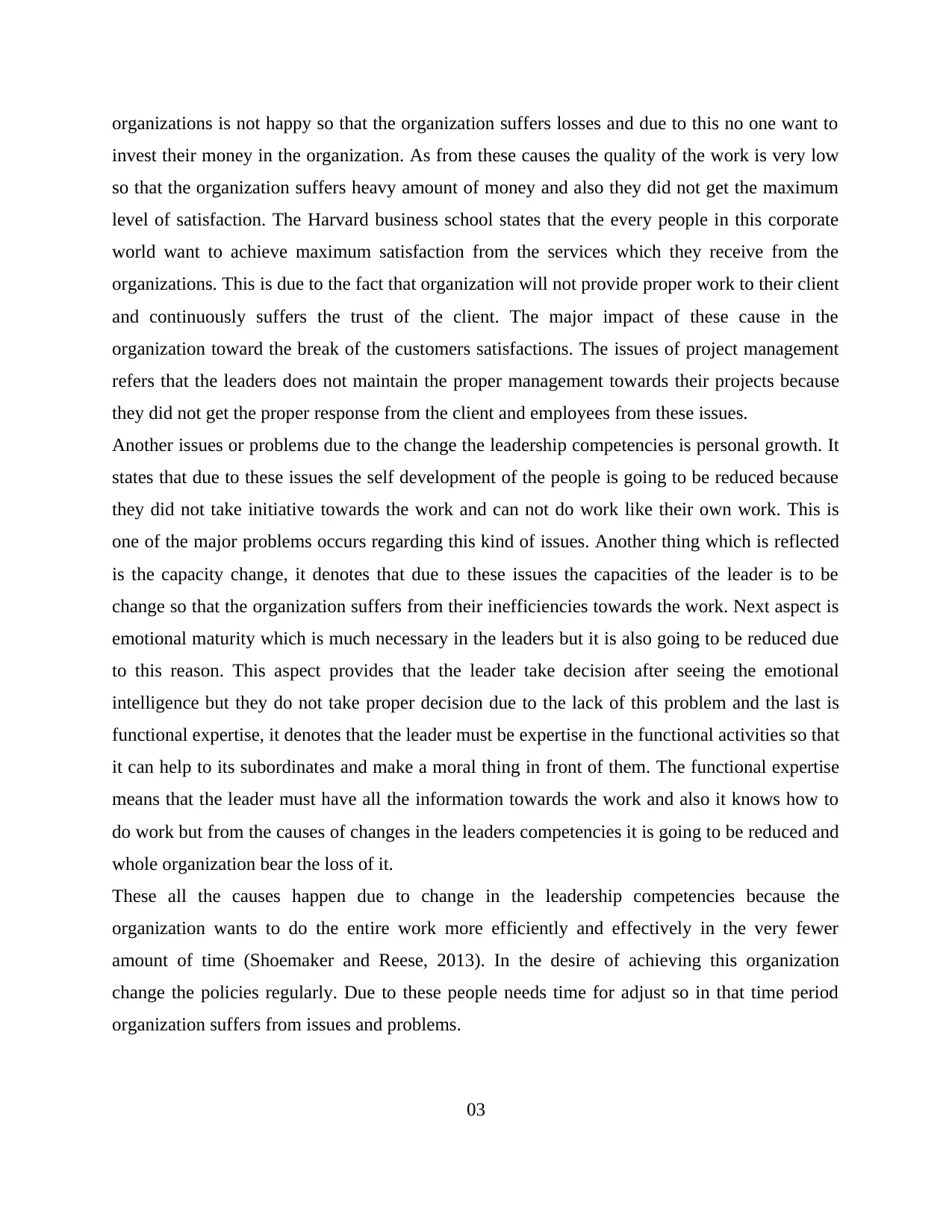
organizations is not happy so that the organization suffers losses and due to this no one want to
invest their money in the organization. As from these causes the quality of the work is very low
so that the organization suffers heavy amount of money and also they did not get the maximum
level of satisfaction. The Harvard business school states that the every people in this corporate
world want to achieve maximum satisfaction from the services which they receive from the
organizations. This is due to the fact that organization will not provide proper work to their client
and continuously suffers the trust of the client. The major impact of these cause in the
organization toward the break of the customers satisfactions. The issues of project management
refers that the leaders does not maintain the proper management towards their projects because
they did not get the proper response from the client and employees from these issues.
Another issues or problems due to the change the leadership competencies is personal growth. It
states that due to these issues the self development of the people is going to be reduced because
they did not take initiative towards the work and can not do work like their own work. This is
one of the major problems occurs regarding this kind of issues. Another thing which is reflected
is the capacity change, it denotes that due to these issues the capacities of the leader is to be
change so that the organization suffers from their inefficiencies towards the work. Next aspect is
emotional maturity which is much necessary in the leaders but it is also going to be reduced due
to this reason. This aspect provides that the leader take decision after seeing the emotional
intelligence but they do not take proper decision due to the lack of this problem and the last is
functional expertise, it denotes that the leader must be expertise in the functional activities so that
it can help to its subordinates and make a moral thing in front of them. The functional expertise
means that the leader must have all the information towards the work and also it knows how to
do work but from the causes of changes in the leaders competencies it is going to be reduced and
whole organization bear the loss of it.
These all the causes happen due to change in the leadership competencies because the
organization wants to do the entire work more efficiently and effectively in the very fewer
amount of time (Shoemaker and Reese, 2013). In the desire of achieving this organization
change the policies regularly. Due to these people needs time for adjust so in that time period
organization suffers from issues and problems.
03
invest their money in the organization. As from these causes the quality of the work is very low
so that the organization suffers heavy amount of money and also they did not get the maximum
level of satisfaction. The Harvard business school states that the every people in this corporate
world want to achieve maximum satisfaction from the services which they receive from the
organizations. This is due to the fact that organization will not provide proper work to their client
and continuously suffers the trust of the client. The major impact of these cause in the
organization toward the break of the customers satisfactions. The issues of project management
refers that the leaders does not maintain the proper management towards their projects because
they did not get the proper response from the client and employees from these issues.
Another issues or problems due to the change the leadership competencies is personal growth. It
states that due to these issues the self development of the people is going to be reduced because
they did not take initiative towards the work and can not do work like their own work. This is
one of the major problems occurs regarding this kind of issues. Another thing which is reflected
is the capacity change, it denotes that due to these issues the capacities of the leader is to be
change so that the organization suffers from their inefficiencies towards the work. Next aspect is
emotional maturity which is much necessary in the leaders but it is also going to be reduced due
to this reason. This aspect provides that the leader take decision after seeing the emotional
intelligence but they do not take proper decision due to the lack of this problem and the last is
functional expertise, it denotes that the leader must be expertise in the functional activities so that
it can help to its subordinates and make a moral thing in front of them. The functional expertise
means that the leader must have all the information towards the work and also it knows how to
do work but from the causes of changes in the leaders competencies it is going to be reduced and
whole organization bear the loss of it.
These all the causes happen due to change in the leadership competencies because the
organization wants to do the entire work more efficiently and effectively in the very fewer
amount of time (Shoemaker and Reese, 2013). In the desire of achieving this organization
change the policies regularly. Due to these people needs time for adjust so in that time period
organization suffers from issues and problems.
03
Paraphrase This Document
Need a fresh take? Get an instant paraphrase of this document with our AI Paraphraser
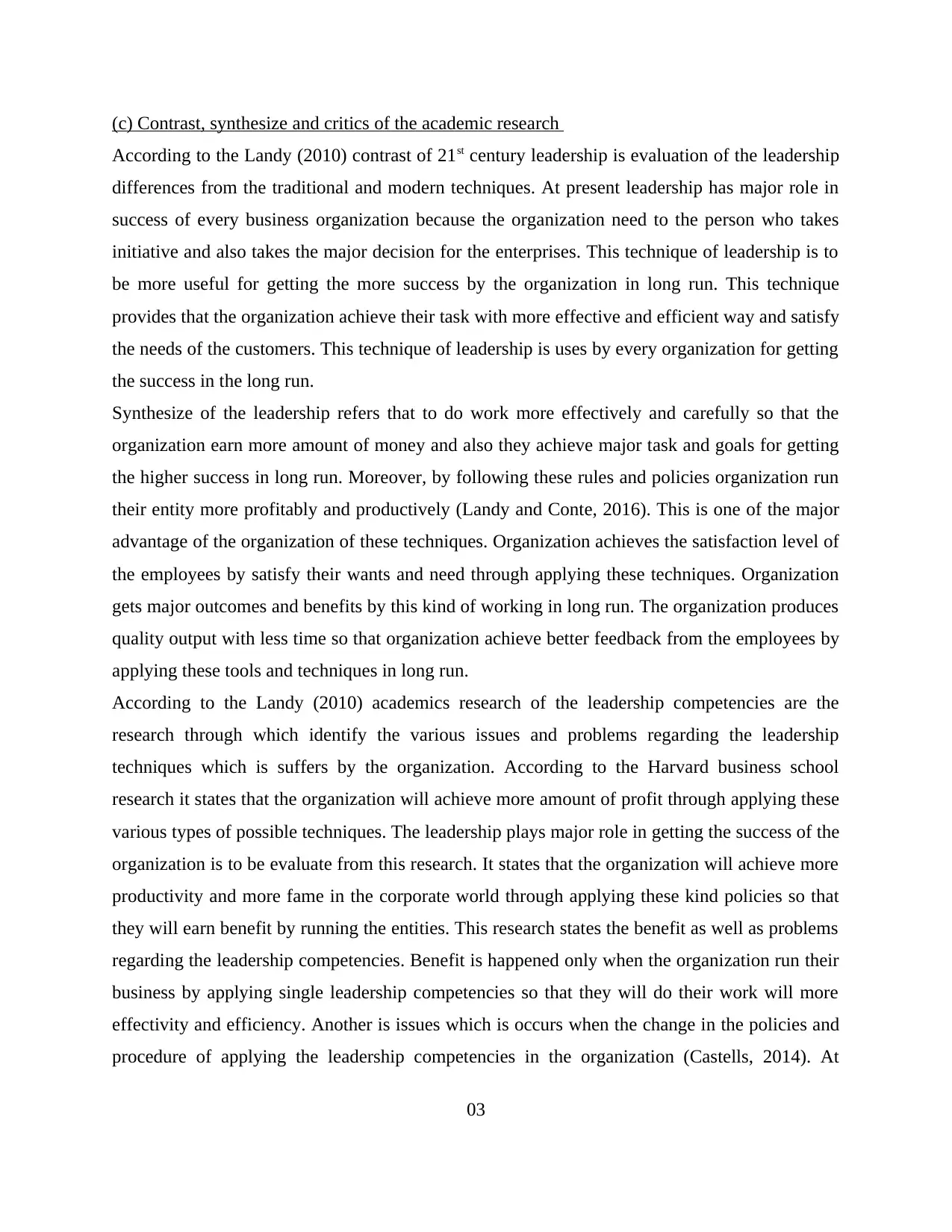
(c) Contrast, synthesize and critics of the academic research
According to the Landy (2010) contrast of 21st century leadership is evaluation of the leadership
differences from the traditional and modern techniques. At present leadership has major role in
success of every business organization because the organization need to the person who takes
initiative and also takes the major decision for the enterprises. This technique of leadership is to
be more useful for getting the more success by the organization in long run. This technique
provides that the organization achieve their task with more effective and efficient way and satisfy
the needs of the customers. This technique of leadership is uses by every organization for getting
the success in the long run.
Synthesize of the leadership refers that to do work more effectively and carefully so that the
organization earn more amount of money and also they achieve major task and goals for getting
the higher success in long run. Moreover, by following these rules and policies organization run
their entity more profitably and productively (Landy and Conte, 2016). This is one of the major
advantage of the organization of these techniques. Organization achieves the satisfaction level of
the employees by satisfy their wants and need through applying these techniques. Organization
gets major outcomes and benefits by this kind of working in long run. The organization produces
quality output with less time so that organization achieve better feedback from the employees by
applying these tools and techniques in long run.
According to the Landy (2010) academics research of the leadership competencies are the
research through which identify the various issues and problems regarding the leadership
techniques which is suffers by the organization. According to the Harvard business school
research it states that the organization will achieve more amount of profit through applying these
various types of possible techniques. The leadership plays major role in getting the success of the
organization is to be evaluate from this research. It states that the organization will achieve more
productivity and more fame in the corporate world through applying these kind policies so that
they will earn benefit by running the entities. This research states the benefit as well as problems
regarding the leadership competencies. Benefit is happened only when the organization run their
business by applying single leadership competencies so that they will do their work will more
effectivity and efficiency. Another is issues which is occurs when the change in the policies and
procedure of applying the leadership competencies in the organization (Castells, 2014). At
03
According to the Landy (2010) contrast of 21st century leadership is evaluation of the leadership
differences from the traditional and modern techniques. At present leadership has major role in
success of every business organization because the organization need to the person who takes
initiative and also takes the major decision for the enterprises. This technique of leadership is to
be more useful for getting the more success by the organization in long run. This technique
provides that the organization achieve their task with more effective and efficient way and satisfy
the needs of the customers. This technique of leadership is uses by every organization for getting
the success in the long run.
Synthesize of the leadership refers that to do work more effectively and carefully so that the
organization earn more amount of money and also they achieve major task and goals for getting
the higher success in long run. Moreover, by following these rules and policies organization run
their entity more profitably and productively (Landy and Conte, 2016). This is one of the major
advantage of the organization of these techniques. Organization achieves the satisfaction level of
the employees by satisfy their wants and need through applying these techniques. Organization
gets major outcomes and benefits by this kind of working in long run. The organization produces
quality output with less time so that organization achieve better feedback from the employees by
applying these tools and techniques in long run.
According to the Landy (2010) academics research of the leadership competencies are the
research through which identify the various issues and problems regarding the leadership
techniques which is suffers by the organization. According to the Harvard business school
research it states that the organization will achieve more amount of profit through applying these
various types of possible techniques. The leadership plays major role in getting the success of the
organization is to be evaluate from this research. It states that the organization will achieve more
productivity and more fame in the corporate world through applying these kind policies so that
they will earn benefit by running the entities. This research states the benefit as well as problems
regarding the leadership competencies. Benefit is happened only when the organization run their
business by applying single leadership competencies so that they will do their work will more
effectivity and efficiency. Another is issues which is occurs when the change in the policies and
procedure of applying the leadership competencies in the organization (Castells, 2014). At
03
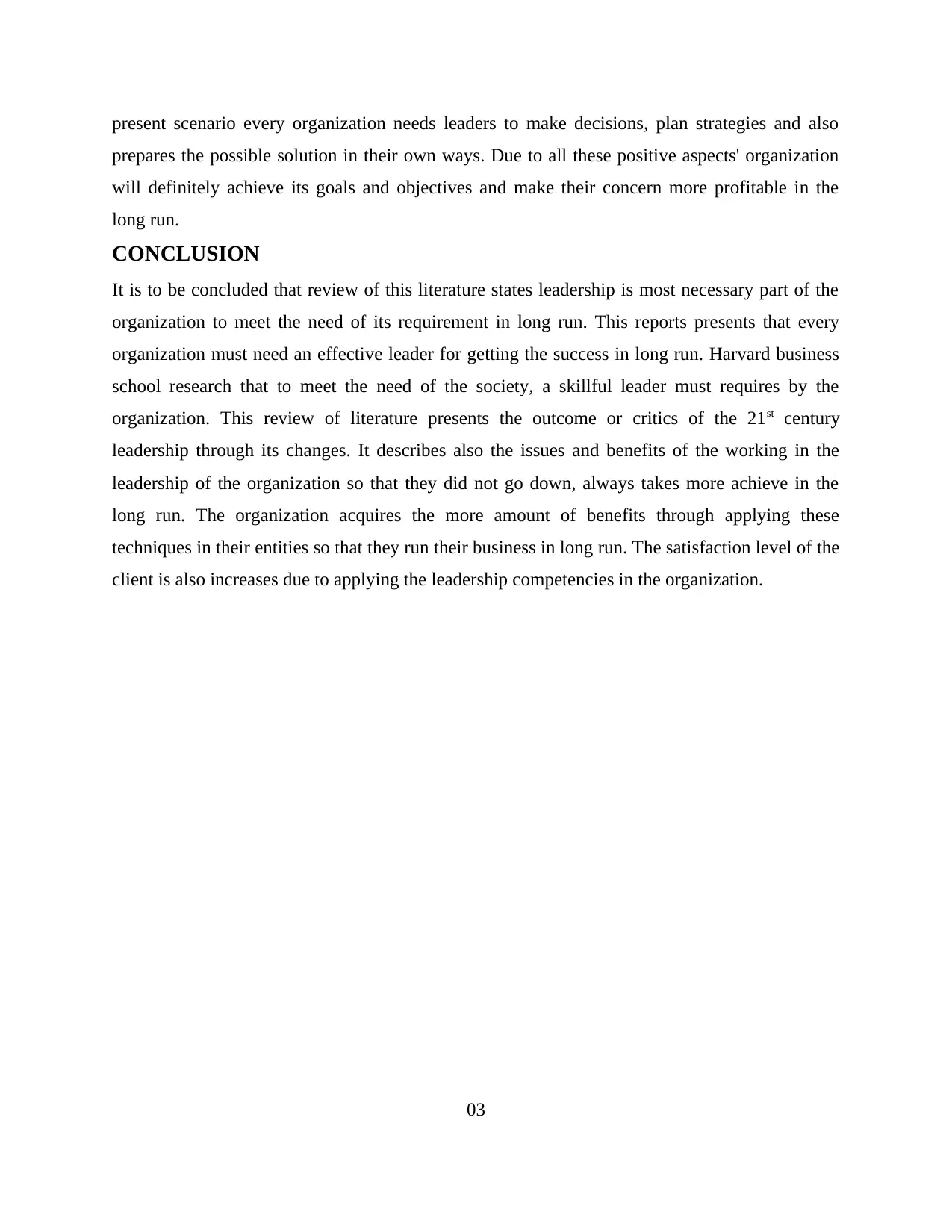
present scenario every organization needs leaders to make decisions, plan strategies and also
prepares the possible solution in their own ways. Due to all these positive aspects' organization
will definitely achieve its goals and objectives and make their concern more profitable in the
long run.
CONCLUSION
It is to be concluded that review of this literature states leadership is most necessary part of the
organization to meet the need of its requirement in long run. This reports presents that every
organization must need an effective leader for getting the success in long run. Harvard business
school research that to meet the need of the society, a skillful leader must requires by the
organization. This review of literature presents the outcome or critics of the 21st century
leadership through its changes. It describes also the issues and benefits of the working in the
leadership of the organization so that they did not go down, always takes more achieve in the
long run. The organization acquires the more amount of benefits through applying these
techniques in their entities so that they run their business in long run. The satisfaction level of the
client is also increases due to applying the leadership competencies in the organization.
03
prepares the possible solution in their own ways. Due to all these positive aspects' organization
will definitely achieve its goals and objectives and make their concern more profitable in the
long run.
CONCLUSION
It is to be concluded that review of this literature states leadership is most necessary part of the
organization to meet the need of its requirement in long run. This reports presents that every
organization must need an effective leader for getting the success in long run. Harvard business
school research that to meet the need of the society, a skillful leader must requires by the
organization. This review of literature presents the outcome or critics of the 21st century
leadership through its changes. It describes also the issues and benefits of the working in the
leadership of the organization so that they did not go down, always takes more achieve in the
long run. The organization acquires the more amount of benefits through applying these
techniques in their entities so that they run their business in long run. The satisfaction level of the
client is also increases due to applying the leadership competencies in the organization.
03
⊘ This is a preview!⊘
Do you want full access?
Subscribe today to unlock all pages.

Trusted by 1+ million students worldwide
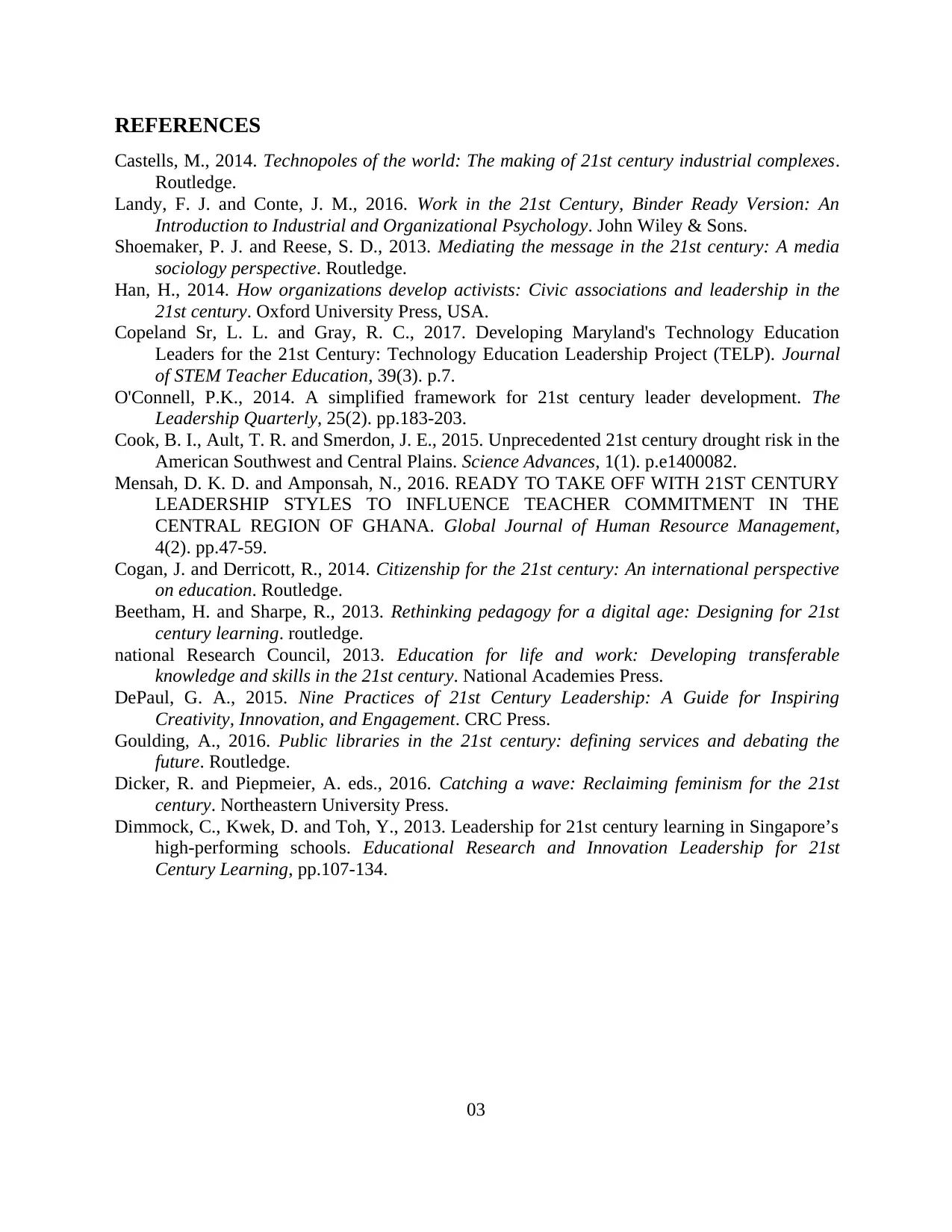
REFERENCES
Castells, M., 2014. Technopoles of the world: The making of 21st century industrial complexes.
Routledge.
Landy, F. J. and Conte, J. M., 2016. Work in the 21st Century, Binder Ready Version: An
Introduction to Industrial and Organizational Psychology. John Wiley & Sons.
Shoemaker, P. J. and Reese, S. D., 2013. Mediating the message in the 21st century: A media
sociology perspective. Routledge.
Han, H., 2014. How organizations develop activists: Civic associations and leadership in the
21st century. Oxford University Press, USA.
Copeland Sr, L. L. and Gray, R. C., 2017. Developing Maryland's Technology Education
Leaders for the 21st Century: Technology Education Leadership Project (TELP). Journal
of STEM Teacher Education, 39(3). p.7.
O'Connell, P.K., 2014. A simplified framework for 21st century leader development. The
Leadership Quarterly, 25(2). pp.183-203.
Cook, B. I., Ault, T. R. and Smerdon, J. E., 2015. Unprecedented 21st century drought risk in the
American Southwest and Central Plains. Science Advances, 1(1). p.e1400082.
Mensah, D. K. D. and Amponsah, N., 2016. READY TO TAKE OFF WITH 21ST CENTURY
LEADERSHIP STYLES TO INFLUENCE TEACHER COMMITMENT IN THE
CENTRAL REGION OF GHANA. Global Journal of Human Resource Management,
4(2). pp.47-59.
Cogan, J. and Derricott, R., 2014. Citizenship for the 21st century: An international perspective
on education. Routledge.
Beetham, H. and Sharpe, R., 2013. Rethinking pedagogy for a digital age: Designing for 21st
century learning. routledge.
national Research Council, 2013. Education for life and work: Developing transferable
knowledge and skills in the 21st century. National Academies Press.
DePaul, G. A., 2015. Nine Practices of 21st Century Leadership: A Guide for Inspiring
Creativity, Innovation, and Engagement. CRC Press.
Goulding, A., 2016. Public libraries in the 21st century: defining services and debating the
future. Routledge.
Dicker, R. and Piepmeier, A. eds., 2016. Catching a wave: Reclaiming feminism for the 21st
century. Northeastern University Press.
Dimmock, C., Kwek, D. and Toh, Y., 2013. Leadership for 21st century learning in Singapore’s
high-performing schools. Educational Research and Innovation Leadership for 21st
Century Learning, pp.107-134.
03
Castells, M., 2014. Technopoles of the world: The making of 21st century industrial complexes.
Routledge.
Landy, F. J. and Conte, J. M., 2016. Work in the 21st Century, Binder Ready Version: An
Introduction to Industrial and Organizational Psychology. John Wiley & Sons.
Shoemaker, P. J. and Reese, S. D., 2013. Mediating the message in the 21st century: A media
sociology perspective. Routledge.
Han, H., 2014. How organizations develop activists: Civic associations and leadership in the
21st century. Oxford University Press, USA.
Copeland Sr, L. L. and Gray, R. C., 2017. Developing Maryland's Technology Education
Leaders for the 21st Century: Technology Education Leadership Project (TELP). Journal
of STEM Teacher Education, 39(3). p.7.
O'Connell, P.K., 2014. A simplified framework for 21st century leader development. The
Leadership Quarterly, 25(2). pp.183-203.
Cook, B. I., Ault, T. R. and Smerdon, J. E., 2015. Unprecedented 21st century drought risk in the
American Southwest and Central Plains. Science Advances, 1(1). p.e1400082.
Mensah, D. K. D. and Amponsah, N., 2016. READY TO TAKE OFF WITH 21ST CENTURY
LEADERSHIP STYLES TO INFLUENCE TEACHER COMMITMENT IN THE
CENTRAL REGION OF GHANA. Global Journal of Human Resource Management,
4(2). pp.47-59.
Cogan, J. and Derricott, R., 2014. Citizenship for the 21st century: An international perspective
on education. Routledge.
Beetham, H. and Sharpe, R., 2013. Rethinking pedagogy for a digital age: Designing for 21st
century learning. routledge.
national Research Council, 2013. Education for life and work: Developing transferable
knowledge and skills in the 21st century. National Academies Press.
DePaul, G. A., 2015. Nine Practices of 21st Century Leadership: A Guide for Inspiring
Creativity, Innovation, and Engagement. CRC Press.
Goulding, A., 2016. Public libraries in the 21st century: defining services and debating the
future. Routledge.
Dicker, R. and Piepmeier, A. eds., 2016. Catching a wave: Reclaiming feminism for the 21st
century. Northeastern University Press.
Dimmock, C., Kwek, D. and Toh, Y., 2013. Leadership for 21st century learning in Singapore’s
high-performing schools. Educational Research and Innovation Leadership for 21st
Century Learning, pp.107-134.
03
1 out of 10
Related Documents
Your All-in-One AI-Powered Toolkit for Academic Success.
+13062052269
info@desklib.com
Available 24*7 on WhatsApp / Email
![[object Object]](/_next/static/media/star-bottom.7253800d.svg)
Unlock your academic potential
Copyright © 2020–2025 A2Z Services. All Rights Reserved. Developed and managed by ZUCOL.




